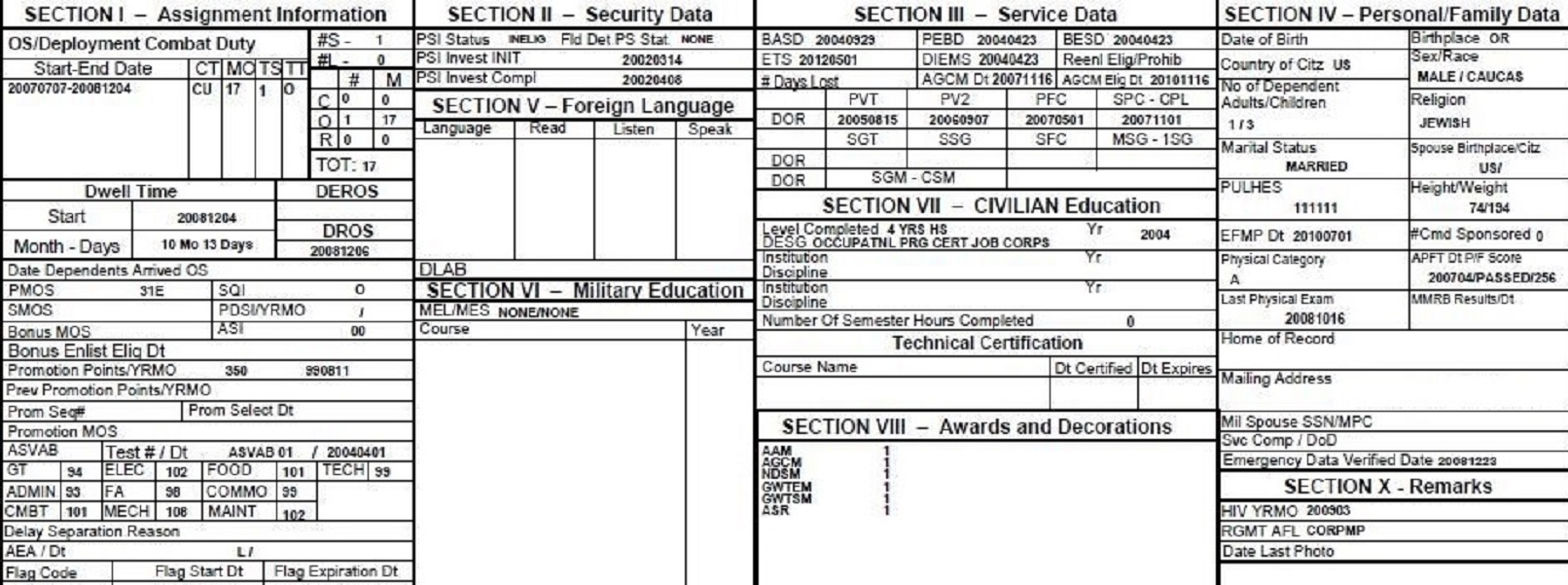Study Your Enlisted Record Brief (ERB) for Professional Development

First published on November 4, 2019
My Enlisted Record Brief (ERB) blog was one of my first personal blogs. It explained how an accurate ERB looks. It’s my most popular military blog as of 2019. I’d hoped my “how to ruck” blog would be at least a contender. Anyway, I figured I’d listen to my analytics and write about the all-knowing military resume again. This time I’ll focus on how to use it for planning career goals. Simply put, I’ll cover getting more on your ERB.
This advice targets junior enlisted Soldiers but applies to all.
Some of this may be out of date as I’ve been out of service for years now. Ask your Chain of Command, related SME’s (S-1, branch manager, etc.), and RallyPoint for up-to-date info related to your military occupational specialty (MOS).
Assignment Information
Have you been in the same unit for years now? Unless you have a good reason for coasting in an unit – e.g. new positions, training opportunities, upcoming deployment, light workload allowing energy for college courses after work – consider asking to transfer units for those reasons. If your MOS works a Staff (S1-6) shop in your battalion or higher element, ask about vacancies. Look into additional duty opportunities involving an ASI or SQI.
Additional Skill Identifier (ASI)
These open you up to additional duties and can set you up for more opportunities when you leave the military. Lean Six Sigma (LSS) certifications for logisticians (92 CMF), Master Fitness Trainer Course (MFTC) for personal trainers, and Sexual Harassment/Assault, Response & Prevention (SHARP) are notable examples. There are many places to see a full list including Army COOL.
Special Skill Identifier (SQI)
Ask about badge and tab courses – Airborne (especially in 82nd), Air Assault (especially near Fort Campbell), Ranger, etc. These courses create opportunities in and out of the military. There’s a position that requires each badge. Also, during Army Career and Alumni Program (ACAP), now Soldier for Life – Transition Assistance Program (SFL-TAP), I heard that employers who know of the Ranger leadership course highly respect it.
Promotion Points
Five (5) correspondence course hours equals one (1) promotion point. Max those out according to your Promotion Point Worksheet (PPW) with courses in Army Training Requirements and Resources System (ATRRS) / Army Learning Management System (ALMS), Joint Knowledge Online (JKO), and Skillport. ATRRS and JKO now have a Distance Learning (DL) column marking courses eligible for promotion points. I recommend starting with the transitioning courses I raved about in the Stars and Stripes Spring 2017 edition (page 22).
The TGPS courses are short, easy, and informative for when you do finally ETS.
GT Score
Have you considered reclassing to a different MOS for better promotion rates? Is the GT score requirements higher than what you have? Finish Basic Skills Education Program (BSEP) now so it doesn’t hold you back later.
Language
Do you know a second language? Find the nearest location you could test out with the Defense Language Institute (DLI).
Do you want to learn another language? Search JKO for a language and whether the course (or curricula) awards DL promotion points. Then test out. I’ve heard having another language on your ERB can make you eligible for some interesting assignments.
Military Education
Try to attend military schools. Airborne, Air Assault, and Ranger are just more popular choices. Army Training and Leader Development (AR 350-1) lists many other schools such as Chemical, Biological, Radiolocal, and Nuclear (CBRN) Defense Course. Combatives goes here, too. Ask around for a full list.
Promotions
Reading your times in grade (TIG) can motivate Specialists, Corporals, and Sergeants on cruise control. But there’s another way to look at time within the promotion point ranks:
- If you have over three years TIG, have you at least acquired some additional duty assignments within that time-frame?
- Have you improved any other fields on your ERB – correspondence points, college, awards?
- Are you doing anything to improve your career?
College
I still wish I’d done more college during my time in service (TIS). Tuition assistance (TA) is free and the only requirement for using it is that you pass the class. The GI Bill will only get you 1-2 degrees even with the improvements from the Forever GI Bill.
Use the TA! Do core classes if you’re unsure what to major in. That’s promotion points and progress that applies in and out of the military. I can tell you from experience that leaving the military and going straight to college isn’t a bad thing. The problem is that you’d be using your limited GI Bill because you didn’t want to make time to use free TA when eligible.
Check the Military Times recommended schools. Ask RallyPoint members about their experience with their chosen schools. Ask your local education center advisors. That’s how I found out about Syracuse University. Unfortunate that they shut down the iSchool InfoSpace blog. I enjoyed writing for it as a way to contribute to the SU community.
So, use the free TA! Moving on.
Technical Certification
I can only speak in-depth for Signal (25 CMF) on certifications, but all Soldiers can use COOL.OSD.mil (or whatever it's called now) to learn about MOS-related certifications like CompTIA Security +, Lean Six Sigma, and The International Society of Logistics (SOLE). You’ll need to check with S1net or S1 personnel for which certs you can add to your ERB Technical Certification section.
Maybe check ALARACTs and MILPER messages, too.
You can use Skillport to prepare for many of these certifications while gaining DL promotion points.
Awards
Awards (10+ points) and certificates of achievement (COAs) (5 points and up to 20 points total for 4) can be rewarded for all of the reasons. They’re physical credentials for somewhere you’ve been or something you’ve accomplished. And many of them award promotion points.
Winning a Soldier of the Quarter (SOQ) or Year (SOY) competition should land you at least a COA. I think SOY deserves at least an Army Achievement Medal (AAM). Anyway, competitors get recognition by the entire chain of command (CoC) which can lead to rare opportunities such as school slots. Airborne.
Check with your local Better Opportunities for Single Soldiers (BOSS) program and Volunteer Management Information System (VMIS) about volunteering opportunities. You could gain helpful skills, improve public relations, and earn a Military Outstanding Volunteer Service Medal (MOVSM) (10 points).
Physical Training (PT)
Exercise. No, Unit PT doesn’t count. No, doing a bunch of push-ups and sit-ups random times during the day isn’t enough. No, getting smoked doesn’t count! Okay. You should train movements, not just muscles. Strive for overall physical and mental fitness.
- Go to the weight room for ~45 minutes to work on those new PT test exercises. Years ago, I read that’s the sweet spot before cortisol kicks in. This is opinion, not fact.
- Don’t care for weight training? Go to a sand pit on base and do some calisthenics. Wear your vest to switch it up.
- Learn how to ruck properly and practice it – with and without your vest.
- Anyone can hop along on a treadmill. Go outside and run. It’s not the same.
- Do pull-ups. No excuses. Start with static holds and negatives, then partials. Build symmetric muscle balance. Save your shoulders.
I can’t offer many tips on the new test because it’s before my time. I’ll link it here if I ever try.
Marksmanship
Do you have a rifle? Practice nickel and dime drills. Focus on the 4 fundamentals – STAB:
- Sturdy Position
- Trigger Squeeze
- [Steady] Aim
- [Controlled] Breathing
No rifle or rubber duck to practice with? If you have free time at work, ask your first line super and Armorer to sign out a rifle for practice. They’ll likely say no, but it doesn’t hurt to try. And it could spark a Leader to make more time for hip-pocket training.
Also, this dives into promotion board territory but learn more about your assigned weapon:
- Maximum effective range (point and group target)
- Maximum range
- Common issues and how to resolve them – e.g. S.P.O.R.T.S.
- Helpful accessories – pistol grip, sling types, better eye/ear protection
- Part names
- TM number (and the words within the TM)
Please don’t leave it unattended or hurt someone. If you’re upset about something, you can talk with the Veteran Crisis Hotline, RallyPoint community, and me directly. One team, one fight.
Duties Listing
Have you had the same duty position multiple times? You need to ask yourself where and what you want to be 5, 10, and 15 years from now. I can’t speak about reaching senior NCO ranks. Ask senior NCOs in your MOS what they’ve done and check RallyPoint forums. And please search for your MOS on RallyPoint for advice before simply creating a potentially duplicate thread.
Is my advice outdated? Let me know on RallyPoint.
Want more? Check out my other military blogs. Or play my first military-focused EP, “2015 (Big Change Coming)” available on Spotify, YouTube, and more.
Tags: military





